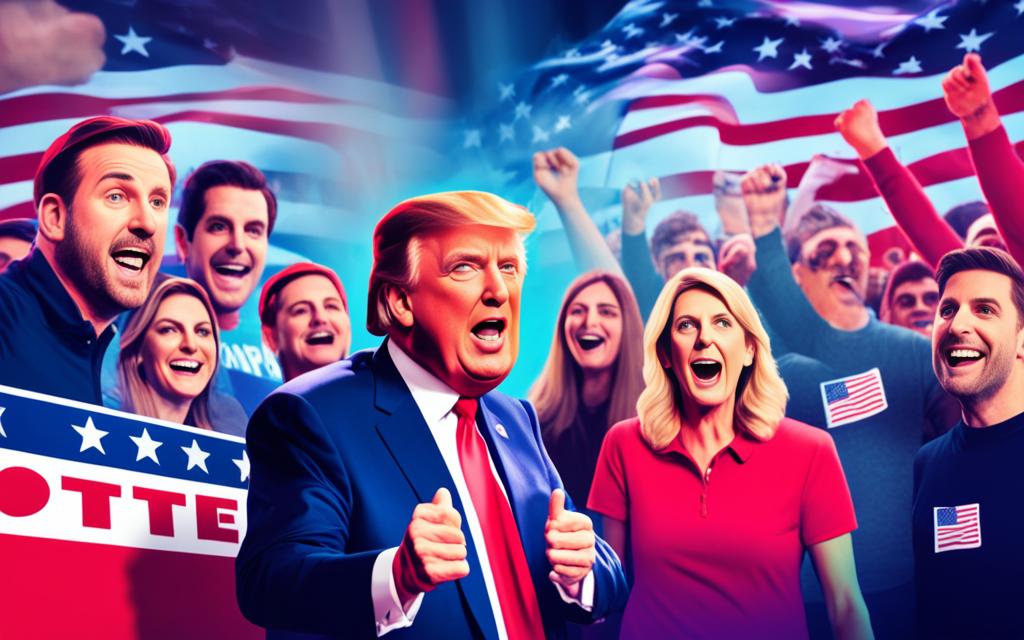Table of Contents
According to a new investigation by BBC Panorama, Trump supporters are spreading dozens of fake artificial intelligence-generated photos showing Donald Trump with Black people. These images appear to be created by the supporters themselves and there is no evidence linking them to Trump’s campaign.
One photo in particular was created by conservative radio show host Mark Kaye. The AI-generated media has caused confusion and misinformation, with captions falsely stating that Trump stopped his motorcade to pose with Black men. Many social media users were convinced that these photos were real, highlighting the ease with which people can be manipulated online.
This tactic of using fake AI images targets Black voters, with the aim of influencing political discourse and promoting Trump’s supposed support for the Black community.
Impact on Black voters and the 2020 election
The use of fake AI images targeting Black voters is part of a larger trend of disinformation tactics aimed at the Black community during the 2020 election. These tactics have had a significant impact on the political landscape, especially among Black voters who play a crucial role in deciding the outcome of elections.
One disinformation tactic that has emerged is the deliberate spread of fake AI images to younger Black voters in swing states. These images are designed to deceive and manipulate, leading to confusion and misinformation among voters. The intention is to influence their political views and potentially sway their votes.
This tactic has had concerning consequences. According to a recent poll conducted by the NYTimes and Siena College, there has been a noticeable decline in support for Joe Biden among Black voters in key swing states compared to the previous election. Only 71% of Black voters in these states expressed their intention to vote for Biden, whereas in 2016, it was 92%. This decline in support is likely influenced by the disinformation campaigns, including the use of fake AI images.
Understanding the impact of these tactics is crucial in order to address and combat misinformation effectively. By recognizing the deliberate targeting of Black voters, the wider public can develop strategies to counter these disinformation campaigns and protect the integrity of the electoral process.
Disinformation tactics and their consequences
The use of fake AI images is just one example of the disinformation tactics employed during the 2020 election. These tactics prey on the vulnerabilities of individuals and communities, exploiting their trust and spreading false narratives. In the case of Black voters, the aim is to create doubts and sow division, potentially affecting voter turnout and influencing election results.
It is essential to be vigilant in identifying and debunking these disinformation campaigns, as they undermine the democratic process and erode trust in political institutions. By staying informed and educated about the tactics used, individuals can make well-informed decisions based on accurate information.
“The deliberate use of fake AI images targeting Black voters is a strategic disinformation tactic aimed at manipulating the election outcome. It is an attempt to exploit the trust and influence of Black voters, potentially impacting the political landscape in significant ways.”
Addressing the issue and future implications
To address the issue of disinformation targeting Black voters, it is essential to implement comprehensive strategies that focus on education, awareness, and proactive outreach. By prioritizing the empowerment of the Black community, initiatives can be developed to counter the effects of disinformation campaigns and ensure that voters have access to accurate information.
Advocacy groups and organizations such as Black Voters Matter can play a vital role in countering disinformation by engaging with the community, providing fact-checking resources, and promoting critical thinking skills. Additionally, political campaigns should prioritize genuine outreach efforts to establish trust and address the concerns of Black voters.
As we face the future, the implications of disinformation campaigns targeting Black voters cannot be ignored. Safeguarding the integrity of elections and protecting the democratic process requires a united effort to combat these tactics effectively. By standing together against disinformation, we can work towards a more equitable and informed political landscape.
Addressing the issue and future implications
The spread of disinformation, particularly through fake AI images, poses a significant challenge in the digital age. To combat this issue, it is crucial to prioritize increasing awareness and education about disinformation among the general public. Individuals should be equipped with the skills to identify and verify the authenticity of media content, especially in relation to political campaigns.
Initiatives and educational programs should be implemented to teach people how to critically assess information and recognize the signs of manipulation. By empowering individuals with these capabilities, we can create a more discerning society that is less susceptible to the influence of disinformation.
Furthermore, organizations such as Black Voters Matter and other advocacy groups have a vital role to play in countering disinformation specifically targeting the Black community. These groups can actively engage with their members, providing resources and tools to help them navigate through the sea of misinformation.
Additionally, political campaigns need to prioritize genuine outreach efforts to address the concerns of Black voters. By actively listening and engaging with this demographic, campaigns can build trust, dispel misinformation, and create a more inclusive political discourse. Investing in targeted outreach and communication strategies will be essential in combating disinformation and fostering a more informed electorate.
FAQ
What are fake AI images and how are they being used by Trump supporters?
Fake AI images are artificial intelligence-generated photos that are being spread by Trump supporters. These images show Donald Trump with Black people and are created by the supporters themselves. There is no evidence linking these images to Trump’s campaign. They are being used to promote Trump’s supposed support for the Black community and influence political discourse.
How has the spread of fake AI images affected Black voters in the 2020 election?
The spread of fake AI images has caused confusion and misinformation among Black voters. Many social media users were convinced that these images were real, highlighting the ease with which people can be manipulated online. This disinformation tactic targets Black voters and may impact their voting decisions by shaping their perception of Trump’s support for the Black community.
Is there a decline in support for Joe Biden among Black voters in swing states compared to the previous election?
Yes, according to a recent NYTimes and Siena College poll, there has been a decline in support for Joe Biden among Black voters in key swing states. Only 71% of Black voters in these states said they would vote for Biden, compared to 92% in the previous election. This decline in support could potentially be influenced by disinformation campaigns, including the spread of fake AI images.
What can be done to address the issue of disinformation targeting Black voters?
It is important to increase awareness and education about disinformation, particularly in the context of political campaigns. Initiatives should be implemented to teach people how to identify and verify the authenticity of media content. Organizations like Black Voters Matter and other advocacy groups can play a role in countering disinformation targeted at the Black community. Political campaigns should also focus on genuine outreach efforts to engage and address the concerns of Black voters.
What are the implications for the future in combating misinformation?
The impact of disinformation campaigns can be mitigated by addressing the challenges head-on. By implementing initiatives to educate and empower individuals to identify and verify media content, the spread of fake AI images and other forms of disinformation can be reduced. This will allow for a more informed and inclusive political discourse, ensuring that voters are not swayed by misleading information.













